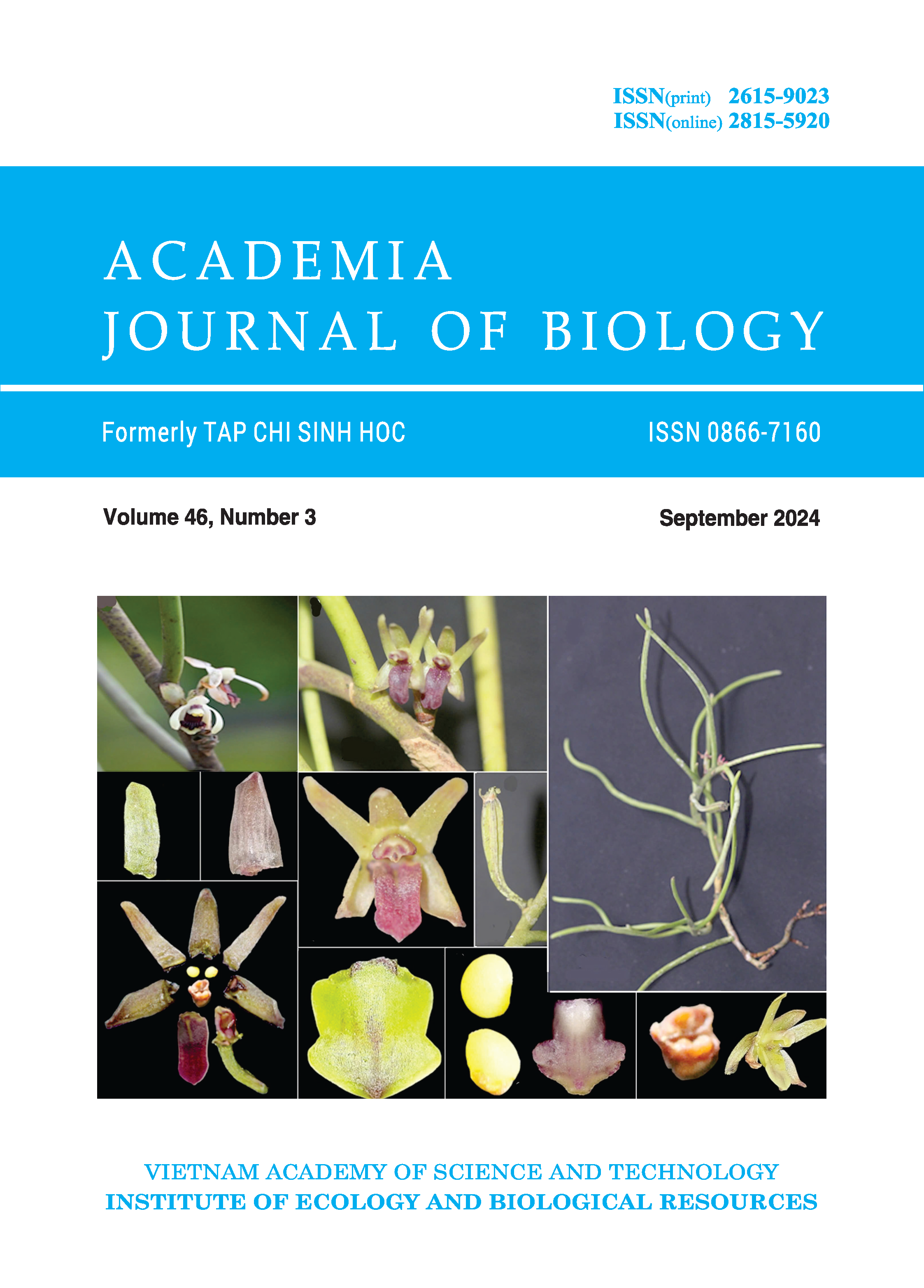Complete mitochondrial genome of vulnerable fighting fish Betta coccina (Actinoptergii: Perciformes: Osphronemidae) with phylogenetic consideration
Author affiliations
DOI:
https://doi.org/10.15625/2615-9023/20915Keywords:
Mitochondrial DNA, Betta coccina, phylogenetic, mitogenome.Abstract
We reported the first complete mitochondrial genome of the Scarlet Fighting Fish, Betta coccina (Vierke, 1979), a species of concern due to its vulnerable status. Genome skimming was performed on a specimen collected from Johor, Malaysia to recover its mitochondrial genome. The assembled complete mitogenome is 16,502 bp in size, comprising the standard set of 13 protein-coding genes, 22 tRNAs, and two rRNAs, typical of most vertebrates mitogenome. Phylogenetic analysis was conducted using the whole mitogenome of B. coccina and four publicly available mitogenomes of Betta spp. Our analysis revealed that the B. coccina currently occupied a basal position relative to other Betta spp. with maximal support value. Our results provide valuable insights for both evolutionary studies and genetic conservation efforts of B. coccina and its related species.
Downloads
References
Chandra S., Abhilash R., Sidharthan A., Raghavan R., Dahanukar N., 2024. Complete mitogenome of Lepidopygopsis typus, an evolutionarily-distinct, endangered cyprinid fish from the Western Ghats Biodiversity Hotspot: Phylogenetic relationships and implications for conservation. Gene, 898: 148098.
Chen X. J., Song L. & Liu W. Z., 2022. Seven fish complete mitochondrial genomes of the Gastromyzontidae in Southern China (Teleostei: Cypriniformes). Mitochondrial DNA Part B, 7(4): 624–626.
Dan Z. C., Guan D. L., Jiang T., Wang H., Zhao L., Xu S. Q., 2022. Evolution of Gene Arrangements in the Mitogenomes of Ensifera and Characterization of the Complete Mitogenome of Schizodactylus jimo. Int. J. Mol. Sci., 23(20):12094.
Dziedzic E., 2023. Creating, curating and evaluating a mitogenomic reference database to improve regional species identification using environmental DNA. Mol. Ecol. Resour., 23(8): 1880−1904.
Dziedzic E., Sidlauskas B., Cronn R., Anthony J., Cornwell T., Friesen T., Levi, T., 2022. Transitioning from environmental genetics to genomics using mitogenome reference databases.
Dziedzic E., Sidlauskas B., Cronn R., Anthony J., Cornwell T., Friesen T., Terborgh, J., 2023. Creating, curating, and evaluating a mitogenomic reference database to improve regional species identification using environmental DNA. Mol. Ecol. Resour., 23(8): 1880−1904.
IUCN, 2022. The IUCN Red List of Threatened Species. Version 2022-2. https://www.iucnredlist.org/. (accessed: 23/09/2023).
Linke H., 1991. Labyrinth Fish: The Bubble-Nest-Builders. Tetra-Press, Melle, Germany.
Minh B. Q., Schmidt H. A., Chernomor O., Schrempf D., Woodhams M. D., von Haeseler A., Lanfear R., 2020. IQ-TREE 2: New models and efficient methods for phylogenetic inference in the genomic era. Mol. Biol. Evol., 37: 1530−1534.
Muhala V., Guimarães-Costa A., Bessa-Silva A. R., Rabelo L. P., Carneiro J., Macate I. E., Watanabe L., Balcázar O. D., Gomes G. E., Vallinoto M. & Sampaio I., 2024. Comparative mitochondrial genome brings insights to slight variation in gene proportion and large intergenic spacer and phylogenetic relationship of mudskipper species. Scientific Reports, 14(1): 3358.
Osborne M. J., Cameron A. C., Fitzgerald B. P., Mckitrick S. A., Paulk M. R., & Turner T. F., 2020. The complete mitochondrial genomes of three imperiled cyprinid fishes Bonytail (Gila elegans), Rio Grande Silvery Minnow (Hybognathus amarus) and Loach Minnow (Tiaroga cobitis). https://www.tandfonline.com/doi/full/10.1080/23802359.2020.1774435
Osawa S., Ohama T., Jukes T. H., Watanabe K., 1989. Evolution of the mitochondrial genetic code. I. Origin of AGR serine and stop codons in metazoan mitochondria. J. Mol. Evol., 29(3): 202−207.
Tan H. H., Ng P. K. L., 2005. The fighting fishes (Teleostei: Osphronemidae: Genus Betta) of Singapore, Malaysia and Brunei. Raffles B. Zool., 13: 43−99.
Zhang D., Gao F., Jakovlić I., Zou H., Zhang J., Li W. X., Wang G. T., 2020. PhyloSuite: An integrated and scalable desktop platform for streamlined molecular sequence data management and evolutionary phylogenetics studies. Mol. Ecol. Resour., 20(1): 348−355.
Zhang, Renyi, Tingting Zhu, and Qi Luo, 2023. The Complete Mitochondrial Genome of the Freshwater Fish Onychostoma ovale (Cypriniformes, Cyprinidae): Genome Characterization and Phylogenetic Analysis. Genes, 14(6): 1227.
Zhu T., Sato Y., Sado T., Miya M., Iwasaki W., 2023. MitoFish, MitoAnnotator, and MiFish Pipeline: Updates in ten years. Mol. Biol. Evol., 40: msad035.
Downloads
Published
How to Cite
Issue
Section
License
Copyright (c) 2024 Muhammad Fitri Yusof, Zarick Zainon, Muhamad Zudaidy Jaapar, Md. Ali Amatul-Samahah, Mohd Azrul Naim Mohamad, Adriana Batrisyia Mohd Faisal, Han Ming Gan

This work is licensed under a Creative Commons Attribution-NonCommercial-NoDerivatives 4.0 International License.
Academia Journal of Biology (AJB) is an open-access and peer-reviewed journal. The articles published in the AJB are licensed under a Creative Commons Attribution-NonCommercial-NoDerivatives 4.0 International License (CC BY-NC-ND 4.0), which permits for immediate free access to the articles to read, download, copy, non-commercial use, distribution and reproduction in any medium, provided the work is properly cited (with a link to the formal publication through the relevant DOI), and without subscription charges or registration barriers. The full details of the CC BY-NC-ND 4.0 License are available at https://creativecommons.org/licenses/by-nc-nd/4.0/.










